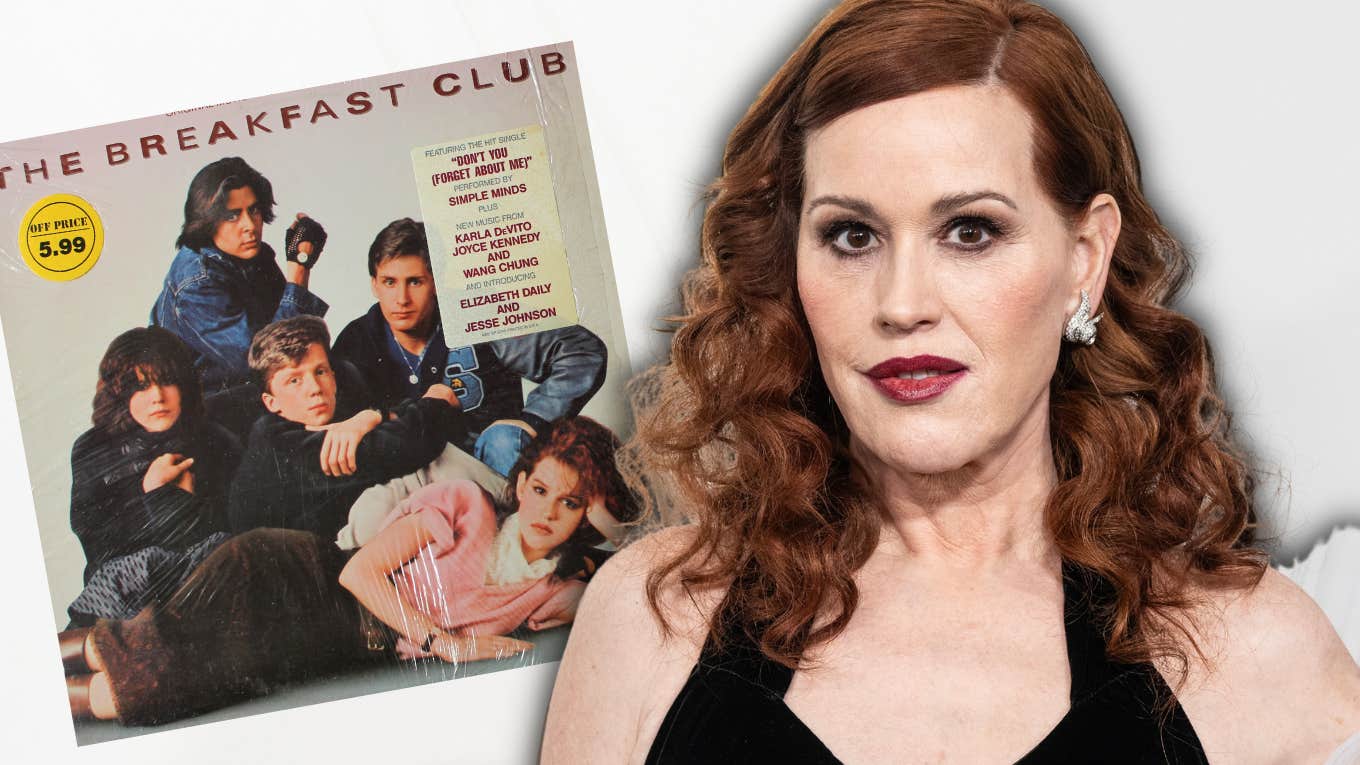How Watching 'The Breakfast Club' With Her Daughter Changed Molly Ringwald As A Parent
Viewing the characters' stories from the perspective of a parent was a much needed wake-up call.
 Blueee77, lev radin / Shutterstock.com; Canva Pro
Blueee77, lev radin / Shutterstock.com; Canva Pro Back in the 1980s, practically nobody was a bigger star among young people than Molly Ringwald, and it all stemmed from her appearance in one iconic film "The Breakfast Club."
But Ringwald, who currently plays Johnny Carson's ex-wife Joanne Carson in the FX series "Feud: Capote vs. The Swans," said her relationship with that film is a complicated one — especially after she revisited it some 30 years later.
'The Breakfast Club' changed Molly Ringwald as a parent after she watched it with her own daughter.
John Hughes' "The Breakfast Club," in which five teens from completely different social groups are thrust into a Saturday detention together, is a cultural touchstone for many Gen Xers and millennials because of the unflinching, relatable glimpse it gave into the often dark realities teen life.
It made overnight stars of its entire cast, who were dubbed "The Brat Pack," and Ringwald's starring roles in Hughes' other '80s movies like "Sixteen Candles" and "Pretty In Pink" made her something like the Taylor Swift of her day. A young woman that nearly every teen girl adulated and looked up to.
But Ringwald has been candid about how all that fame and scrutiny at such a tender age impacted her. She all but fled Hollywood beginning in the 1990s because of it, only recently resurfacing in series like the CW's "Riverdale," Netflix's "Dahmer – Monster: The Jeffrey Dahmer Story," and FX's "The Bear."
That complicated relationship with "The Breakfast Club," combined with its very 1980s approach to sexual politics, made Ringwald downright nervous when her daughter Mathilda asked to watch it 30 years later.
Some themes of 'The Breakfast Club' now seem problematic, and Ringwald was hesitant to revisit it when her daughter asked about it.
"I played it for my now 20-year-old daughter when she was 10, which was really, I think, too young to watch 'The Breakfast Club,'" Ringwald recently told NPR.
The film is full of dynamics that would never fly in a teen film in 2024. The love story between Ringwald's character Claire Standish and co-star Judd Nelson's John Bender, for instance, hinges on a sort of seduction scene that now reads like an extremely disturbing episode of sexual harassment.
And that's before we even get into the fact that 55-year-old Ringwald was just 16 at the time.
"But all of her friends had seen it," Ringwald said of Mathilda, "and she didn't want to watch it at a slumber party... She wanted to watch it with me." So she reluctantly relented.
'The Breakfast Club' characters' struggles with their parents is what most resonated with Ringwald's daughter, and it held up a mirror to her own parenting.
"It was really interesting to watch it with her and what she got out of it because, you know, at the age of 10, there was a lot of stuff that went over her head," Ringwald told NPR. "We just kind of glossed over [the sexual innuendo] when we talked about it."
But what did stick with Mathilda was the film's central theme: the characters' dynamics with their parents, who all, in one way or another, fail to see their teens as people or take seriously their struggles and the roles they themselves play in them.
In a 2014 piece for the radio show and podcast "This American Life," recorded while Ringwald and then 10-year-old Mathilda watched the film, Ringwald asked her daughter if there were any characters that made her think, "Yeah, that's what I feel like."
Mathilda responded that she identified with Brian Johnson, the straight-A student geek played by Anthony Michael Hall who is so afraid of his parents' wrath for failing a school project that he attempts suicide.
"You kind of, like, sometimes pressure me in school," Mathilda nervously told Ringwald in the recording. "At the time, I was having a hard time with making her do her homework," Ringwald told NPR. "I wanted her to be a certain kind of student."
But the pressures resulted in Mathilda bursting into tears as they discussed it for the radio show, and Ringwald went on to tell NPR that having a mirror held up to her in that way was a powerful moment that ultimately made her a better mother.
"It was really an incredible experience to be able to have that conversation and actually feel like it changed my relationship with her and it changed my way of parenting," she told NPR.
The perspective Ringwald gained in her '80s film work is like a metaphor for parenting itself.
Ultimately, revisiting the film, imperfect as it is, seems to have helped Ringwald avoid the traps the characters' parents, and so many real-life parents, fell into. And the takeaway she gained ironically says so much about parenting itself.
"Those movies are not perfect, but there is so much good in them," she told NPR. "I feel like it's important to look at where we have come from, because I don't think that we can understand where we're going if we don't look at where we've come from."
She went on to say that she doesn't believe in running from the past or trying to erase the problematic parts, but rather facing them head-on and learning from them.
"That is one of the dangers of this desire to erase the past," she said. "I don't personally believe that you can erase the past, but you can look at it… I believe that talking about it and understanding it is what sets us free."
Solid advice for anyone trying to learn from the past and do better.
John Sundholm is a news and entertainment writer who covers pop culture, social justice and human interest topics.
